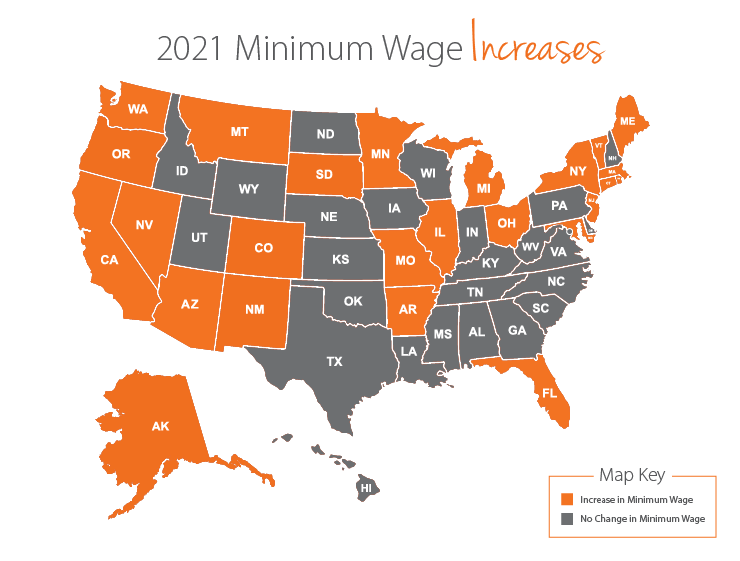I think if states start setting their own minimum wages above that of the Federal minimum wage, it will reduce any political pressure on Congress to actually raise the minimum wage.
Minimum Wage By State In 2020 & 2021 | Paycor
State 2020 Minimum Wage 2021 Minimum Wage
Alabama $7.25 (Federal, no state minimum) $7.25 (Federal, no state minimum)
Alaska $10.19 $10.34
Arizona $12.00 $12.15
Arkansas $10.00 $11.00
California $13.00 $14.00*
Colorado $12.00 $12.32
Connecticut $12.00 $13.00 (effective 8/1/21)
Delaware $9.25 $10.25
Washington D.C. $15.00 $15.00
Florida $8.56 $10.00 (effective 9/30/21)
Georgia $5.15 (Employers subject to Fair Labor Standards Act must pay the $7.25 Federal minimum wage.) $5.15 (Employers subject to the Fair Labor Standards Act must pay the $7.25 Federal minimum wage)
Hawaii $10.10 $10.10
Idaho $7.25 $7.25
Illinois $10.00 $11.00
Indiana $7.25 $7.25
Iowa $7.25 $7.25
Kansas $7.25 $7.25
Kentucky $7.25 $7.25
Louisiana $7.25 (Federal, no state minimum) $7.25 (Federal, no state minimum)
Maine $12.00 $12.15
Maryland $11.00 $11.75**
Massachusetts $12.75 $13.50
Michigan $9.65 $9.65
Minnesota $10.00 $10.08***
Mississippi $7.25 (Federal, no state minimum) $7.25 (Federal, no state minimum)
Missouri $9.45 $10.30
Montana $8.65 $8.75
Nebraska $9.00 $9.00
Nevada $8.00 $8.75 (effective 7/1/21)****
New Hampshire $7.25) $7.25
New Jersey $11.00 $12.00*****
New Mexico $9.00 $10.50
New York $11.80 $12.50******
North Carolina $7.25 $7.25
North Dakota $7.25 $7.25
Ohio $8.70 $8.80
Oklahoma $7.25 $7.25
Oregon $12.00 $12.75 (effective 7/1/21)******
Pennsylvania $7.25 $7.25
Rhode Island $10.50 $11.50
South Carolina $7.25 (Federal, no state minimum) $7.25 (Federal, no state minimum)
South Dakota $9.30 $9.45
Tennessee $7.25 (Federal, no state minimum) $7.25 (Federal, no state minimum)
Texas $7.25 $7.25
Utah $7.25 $7.25
Vermont $10.96 $11.75
Virginia $7.25 $9.50 (effective 5/1/21)
Washington $13.50 $13.69
West Virginia $8.75 $8.75
Wisconsin $7.25 $7.25
Wyoming $5.15 (Employers subject to Fair Labor Standards Act must pay the Federal minimum wage.) $5.15 (Employers subject to the Fair Labor Standards Act must pay the $7.25 Federal minimum wage)
Washington DC already has a minimum wage of $15 an hour, so that can be used as a model to see what it would look like. California is at $14 an hour for employers who have 26 or more employees. So, we already have a glance at the kind of impact it's having on the states where the wage is higher.
As to why so many states seem dominated by cheapskates, that's hard to say. The funny thing is, the same people who keep saying that wages and prices should be set by the free market are the same ones who claim they're facing labor shortages (which is why they insist they need to hire undocumented immigrant workers - to do the jobs Americans won't do, apparently). They can't have it both ways, but I'm sure they're going to try to milk it for as long as they can.
It is disappointing that it was a few Democrats who fell out of the fold and blocked the minimum wage increase. One of them was Senator Sinema from Arizona, which is somewhat surprising, since Arizona's minimum wage was increased due to the passage of a ballot proposition in 2016, which incrementally raised the minimum wage year by year to what it is now. So, she knows that the voters of the state support a minimum wage increase, and yet, she opposed it just the same. This could cost her some votes in the next election.

